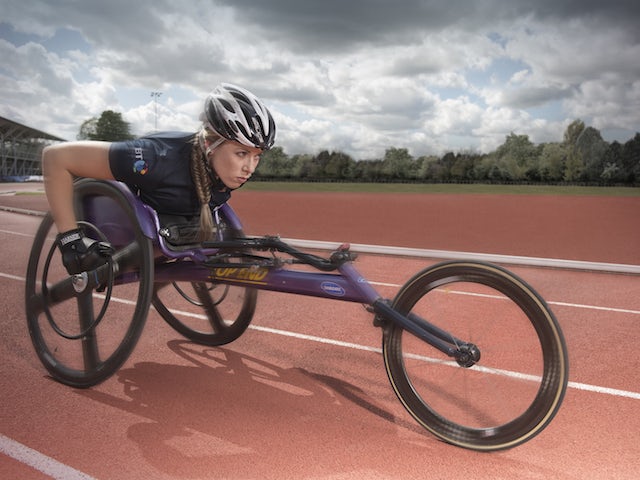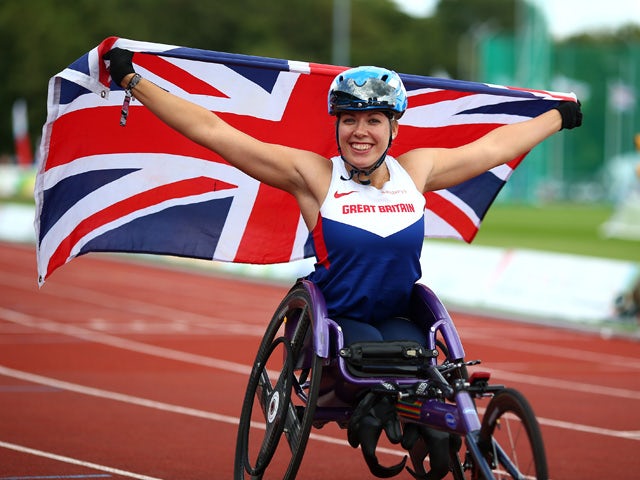"I'll prove to people that I haven't lost it" - those are the words of a double Paralympic gold medallist and four-time world champion whose unblemished record suffered a dent just three weeks before the IPC World Championships in Doha.
British wheelchair racer Hannah Cockroft has the chance of defending her T34 100m world title for a third consecutive time next month, but she needs to overcome the disappointment of losing her seven-year unbeaten run following defeat to 14-year-old compatriot Kare Adenegan in the 400m event.
The 23-year-old, who has set world records in the 100m, 200m, 400m and 800m, spoke to Sports Mole about her desire to remain the world's best, what's behind her public positive persona, and why she is adamant that the London 2012 legacy lives on.

Firstly, with the World Championships just three weeks away now, how are you feeling?
"I'm feeling good. This season's been really long, I've been competing since February. I'm getting to that stage of fatigue, but [I feel] good. Training's going really well, I feel quite fit, quite healthy. I'm just waiting for my new chair, hopefully that will get here before Doha! Mine's a little bit broken. I'm excited for the season to end, which is probably the wrong way to look at it, but it's just been a very long year."
Given that it's been a long season for you, what are the main aspects that you've been working on in training?
"Last year the IPC took the 200m out for my classification and put in an 800m and then in May this year they also added 400m, so in Rio and in Doha I will have the 100m, 400m and 800m, which is completely different than the 100m and 200m sprints that I've had in London so I've had to completely change my mindset, the way I've trained - just the way I am as an athlete really to try to work towards longer distances. So, I do a lot more mileage. This season we've done two winter blocks because we sort of peaked when we competed near June time and now we're trying to peak again, so just a couple of months ago we had to go back into winter training and heavy blocks of training, so it was getting to that point where my body was like, 'what are you doing, you're meant to be stopping, why are you getting harder?!'
"I think it's more of a mental thing than a physical thing, especially with the World Championships being in Doha, we're trying to in the next couple of weeks work towards acclimatising for the hot weather, which again is very fatiguing. Just being in the heat and dehydrating quickly can take a lot out of you as an athlete, so it's going to be interesting doing the long distances in those conditions but we'll just see how it goes."
Is it fair to say then that the 800m is the most challenging for you? Especially considering it's much more tactical.
"Yeah, it is. The tactics is the bit that I'm struggling with as well because it's just completely new, but I also like the challenge. I get to show people that I'm not a one-trick pony. I can go out there and do more than push fast in a straight line and stay in lane. It is challenging, it's scary, the races are a lot closer than they ever have been, but that's what it's all about - showing people that I can do more than one thing.
"I can think on my feet and sometimes you get into sticky situations where you're thinking, 'I don't know where I'm supposed to be in this race to try to get to the front'. My biggest problem is the majority of the time I train on my own so it's really difficult to practise, but I'm not going to be the only girl in that situation. Sometimes that can be a positive because you can go into a race clear with no planned tactics and see what happens. You can never plan what the other girls are going to do, so just roll with it and hope for the best. So far so good!"
Your list of achievements is very impressive. In Doha, are you only focusing on trying to win gold or are you thinking about new world records as well?
"The aim in Doha will be medals. In my head, a world record is brilliant because it means I'm getting faster, but actually at a major championships, no-one remembers the time you ran unless you're Usain Bolt! No-one remembers record times or anything that you do aside from World Championship gold or Paralympic gold - they are the full aims. If I can get gold in really slow times, I'll be really happy as well, but I think I'm really going to have to fight this year. I'm going to have to fight to win my first triple world title, but that's exciting. I want to show people that now that there's competition, I still am the best in the world."
Speaking of the competition that you face, at the weekend, your seven-year unbeaten run came to an end after losing to Kare Adenegan in Newham, which must have been disappointing for you. Considering that the Worlds are just a few weeks away, is that a bit of a worry?
"Yeah, being beaten for the first time in seven years was a bit of a shock and it's added nerves to the excitement of the World Championships, but I was getting a little complacent. I went into the race on Saturday relaxed and thinking that I knew what was going to happen in the race - I knew how it was going to pan out, I knew how it was going to finish, and actually going into it [I was] just so relaxed and confident - I completely lost my speed and kind of forgot that I was in a race situation. The shock at the end of it has now given me the motivation and a need to prove to people that I haven't lost it.
"I may be one of the older girls now at 23, which is annoying, but I still can be the best and I still deserve to be where I am. I've trained hard this season and just because it's long and maybe I've over-competed, it doesn't mean I'm past my best. [Losing] was tough, but I think it was a good time for it to happen. I prefer for it to happen there than at the Championships. I've got three weeks to work it out, sort my head out and just go in there and show everyone exactly what I can do."
You say it was the best time to happen, but do you not feel that because of last weekend's result, Adenegan has a bit of momentum now heading into the Worlds, even though it's her debut?
"I guess she has but I also think that she's got a little bit of pressure as well. I was carrying the target on my back, I was carrying a seven-year unbeaten title and she's beaten me, so now in all the other girls' heads maybe she's the one to beat and not me anymore. She's only 14 years old and it's her first World Championships, so that's going to carry pressure in itself. I do feel for her, but at the end of the day, Kare was the best athlete on Saturday, but we'll have to see who's the best athlete when we get out to Doha. We'll see who's best prepared and hopefully by then I'll sort myself out!"
 © Getty Images
© Getty Images
In interviews you always seem very positive and upbeat, but have there been times in your career when you've asked yourself if this is what you really want, or perhaps questioned the direction you were going in?
"It's happened a lot of times, this year especially has probably been the toughest year that I've faced as an athlete. I've had to balance university and athletics. I feel a lot more travelled - I've been away from home a lot more, away from my family a lot more. Obviously getting beat, having problems with my coaching, problems with my chair, just everything that could have gone wrong feels like it has gone wrong this year. The after-effects of all that are just catching up on me now and I'm trying to run away from them a bit. I'm the kind of person who is very positive all the time, but I will always run away from conflict and I'll never face up to things if I have a problem with it. I'll sit back and wait for it to sort itself out, which is not a great way of doing it.
"There's been plenty of times when I've sat there and [questioned things], especially when people have said, 'Hannah's racing, what's the point in watching this race?' I kind of feel that people don't appreciate the work that I'm putting in, they're not impressed with the work I'm doing anymore, but after losing a seven-year unbeaten title people will now appreciate the hard work that goes into every single race, for all the girls but especially for me. I want people to appreciate that to hold the title for seven years is an achievement and I'm trying to build my next unbeaten seven years now."
You've said before that you've had this fighting spirit all your life - is that what also helps you stay motivated? With the domination that you've had, a different athlete might struggle to keep striving for more...
"You're always going to wake up in the morning and it's snowing, it's wet or it's really, really cold and you think, 'I don't want to go to training today'. I'm just like every other athlete - sometimes it will take you forever to get out of bed, but at the end of the day, I think of it like, I'm 23, I get to travel the world, I get to do and see some of the most amazing things and I've got a job that I absolutely love. I don't think any of my friends can say that.
"I think just because I always have that network of people who remind me what a privileged position I'm in and how lucky I am to actually enjoy everything I do in life. It keeps you wanting more because I've got their support - these are the people who helped me get my first wheelchair, these are the people who got me on my feet, who got me into mainstream schools. You feel like, 'if I don't do this I'm going to let them down'. We've put so much money and time into this to stop doing something that you love. There's always the next thing to go on to. I love to be able to go into a race being the reigning champion and getting to defend it - that's such a good feeling because it says, 'yes, for another year I'm still the best in the world'."
In the summer, a few government officials said that the London 2012 Olympic legacy of 'inspire a generation' had failed with regards to participation in sport. In terms of para-sport, for you personally, have you noticed a big rise in interest since London?
"Massively! The proof is in Kare. She's 14 and she watched me in London and that's how she got into wheelchair racing so she could race like me. If that's not proof of a legacy, then I don't know what else is. She's the first girl to ever beat me and London 2012 was her inspiration. I think people don't look into it in enough detail. Every disability is different, there is always going to be things that some can't do and other disabled people can do - that's life. People maybe just look into the negatives rather than the positives.
"I see the legacy every single day. The first year I came back from London, I went training with my old group. There used to be about four of us who used to train together in Leeds and I came back and there were at least 20 people, old and young, just going along the track in race chairs because they'd heard that's where I started and they wanted to give it a go. By all means are they not all still going today, but a lot of them are, but it's little things like that that people overlook. I see it all the time, I love it, and I think it's great that the support's still there for it. Big companies like BT are very, very involved in keeping that legacy alive and I think it's important because it's unearthing our next Paralympic and Olympic champions. Let's keep it there and keep being successful."

The World Championships are going to be shown live on More Four, which is good exposure for the sport. In terms of TV coverage and media interest, do you think that big strides have been made or does more need to be done?
"I'll always think more needs to be done. I'm in the middle of it, but it's definitely getting better. Our Worlds in 2011 had, I think, an hour highlights show, we didn't really have anything, and now we're getting mainstream coverage, which is great. Just getting it out there gets more people interested, which is always the important thing. I think the exposure lies with the athletes and the media - the athletes need to keep doing things to keep the media interested and the media just need to keep covering us. It's going to be an endless circle, there's always going to be quiet times when nothing's happening - you can't just make a story up and we can't always be on the front and back pages, but it's nice that we do still get good coverage. I'll always fight for more though."
The Worlds are obviously your focus at the moment, but you must already be thinking about the 2016 Paralympics in Rio, especially because you can qualify in Doha?
"Yeah, if you win a gold in Doha, that's your seat on the plane to Rio. It's nice because even though it adds a lot of pressure on the World Championships this year, it takes a lot of pressure off next year and having to over-compete again to try to qualify in time. Hopefully that will go to plan. Obviously Doha is what I'm focusing on right now, but Rio is always in the back of your mind. The Paralympics is the pinnacle of any disabled athletes' career. I'm not convinced that Rio will beat London in my mind and I think that's going to be difficult for all the British athletes but I think it's still going to be absolutely incredible in its own way. I've got the chance of becoming triple Paralympic champion - I can catch up on Tanni Grey-Thompson's medal count!"
On your website you said that when you were younger, one of your ambitions was to be famous. Now that you're widely recognised, is it what you thought it would be? Is it better, is it worse?
"When I was younger 'famous' was never an athlete. When I was a disabled child, I was pushed away from the sporting world. I wanted to be a singer or an actress or something like that, but now that I'm kind of half way there, in the 'sometimes recognised in the Yorkshire streets' category, I don't know. Some days it's great and I absolutely love it, but some days when you don't want to put makeup on and you look a little bit rough and you just want to be on your own [it's not great] because you still have to be nice to people. It's nice to be known though and it's nice to make a mark and be remembered, so I think I still like it."
Hannah Cockroft is a BT Ambassador. BT is a long–time supporter of disability sport in the UK and the founding partner to the British Paralympic Association









